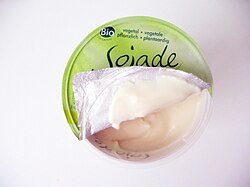Soy yogurt
 Soy yogurt looks like regular cream yogurt | |
| Alternative names | Soya yogurt, soygurt, yofu |
|---|---|
| Type | Yogurt |
| Main ingredients | Soy milk, yogurt culture |

Soy yogurt, also referred to as Soya yogurt, Soygurt or Yofu (a portmanteau of yogurt and tofu), is yogurt prepared with soy milk.
Ingredients[]
Soy yogurt is made using soy milk, adding yogurt bacteria (Lactobacillus delbrueckii subsp. bulgaricus and Streptococcus salivarius subsp. thermophilus), sometimes adding sweeteners such as fructose, glucose, or sugar.[1]
Non-dairy requirements[]
It is suitable for vegans, ovo-vegetarians, for people with PKU or other dangerous diseases, and for those with lactose intolerance or milk allergy, as the bacteria for shop-bought soy yogurt are usually not grown on a dairy base.[citation needed] Due to certain recurring doubts and controversies about the bacterial cultures used, most soy yogurt manufacturers nowadays include certified labels, usually by the Vegan Society or similar vegan organisations, clearly visible on the outer packaging.
Preparation[]
Soy yogurt can be prepared at home using the same method as dairy yogurt, using soy milk and a starter culture.[2][3] One tablespoon of sugar per 1 liter of unsweetened soy milk may be added to promote bacterial fermentation. Soy milk on its own lacks the lactose (milk sugar) that is the basic food for the yogurt bacteria.
Comparisons[]
Soy yogurt may have a slight beany soy taste when made directly from freshly prepared soy milk, but this is less pronounced in shop-bought soy yogurt and in soy yogurt made from commercial soy milk.
Soy yogurt contains less fat than yogurt made with whole milk. This amounts to about 2.7% (the same percentage as soy milk), versus 3.5% in dairy yogurt. However, dairy yogurt can be made with 2%, 1%, or fat-free milk, and soy yogurt can also be made from reduced-fat soy milk.[4]
In 1998, the cost of soy yogurt was similar to dairy yogurt.[3]
Soy yogurt is similar in protein content to dairy yogurt, lower in sugar, and higher in fat. If not fortified, soy yogurt does not contain Vitamin B12 or Vitamin D.[3]
See also[]
- List of soy-based foods
- Plant milk
- Soy milk
References[]
- ^ Soy yogurt
- ^ How to make soy yogurt
- ^ Jump up to: a b c Lightowler, Helen; Davies, Jill (1 January 1998). "The vegan dairy". Nutrition & Food Science. 98 (3): 153–157. doi:10.1108/00346659810208305. ISSN 0034-6659.
- ^ Nutritional values of soy yogurt
External links[]
- Fermented soy-based foods
- Non-dairy yogurts
- Yogurts
- Plant milk
- Vegan cuisine


